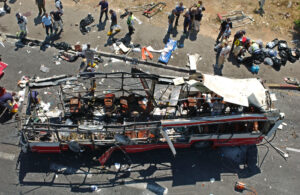Christmas is a time for religious and family traditions. At CNN this weekend, the traditions included appropriating Jesus to besmirch the Jewish state and erasing the existence of Palestinian violence and Israeli victims.
Here are some of the lowlights of CNN’s weekend coverage of the conflict.
Jesus was a “Palestinian Jew”
On Christmas Day, CNN This Morning featured Father Edward Beck who decided to share with the network the Christmas tradition of Palestinian appropriation of Jesus. The religion commentator claimed: “The story of Christmas is about a Palestinian Jew born into an occupied country, having to flee as refugees into Egypt.”
“The story of Christmas is about a Palestinian Jew born into an occupied country, having to flee as refugees into Egypt.” – Father Edward Beck @FrEdwardBeck on @CNN a few minutes ago. @NY_Arch @CardinalDolan pic.twitter.com/EFVsU3i1p4
— Avi Kaner ابراهيم אבי (@AviKaner) December 25, 2023
Aside from everything else wrong with his history (such as the fact that “Palestine” was how the Roman occupiers later renamed the territory to erase the Jewish connection to the land), it raises the question: if Jesus was a Jew born into an “occupied country,” then why would Jews today be considered occupiers in the same place? And if the Romans were the occupying power of Judea & Samaria, what does that make all the subsequent empires and caliphates that controlled the land until the Jewish people finally retook it?
Masking Palestinian Violence as “Israeli Attacks”
Speaking of tradition, CNN continued covering up for Palestinian violence in the West Bank, rather than just simply covering it.
In a 12/24 article, entitled “With war raging in Gaza, Christmas is effectively canceled in Bethlehem,” authors Will Ripley, Mohammed Tawfeeq, and Abeer Salman raised the issue of a “Israeli-built West Bank barrier” and “various checkpoints” restricting movement for Palestinians in Bethlehem.
But the article skips over the reason for the existence of these measures: Palestinian terrorism. The barrier was built only after a horrific wave of Palestinian suicide bombing attacks that killed hundreds of Israelis. Checkpoints have similarly been used to disrupt terror attacks as even CNN used to report about.
Omitting the security reasons behind these measures is highly misleading and, in this context, seems calculated to falsely portray checkpoints and the barrier as needless measures designed just to inconvenience Palestinians.
The article takes it to another level, however. The authors claim, “The occupied territory has also experienced a surge in violence, with at least 300 Palestinians killed in Israeli attacks, according to the Palestinian health ministry.”
Many of those Palestinians were killed not in Israeli attacks, but while attempting to attack Israelis with guns, knives, or vehicles. Some have even managed to kill themselves by mishandling explosives meant for Israelis.
Many of the rest were terrorists, such as Islamic State operative Nabil Halabia, or were actively engaged in violent clashes with Israeli forces engaged in counterterror operations. As reported by the Washington Institute for Near East Policy, as of mid-November, the 270 Palestinian deaths in security incidents “include 123 killed while clashing with IDF units, 74 killed while participating in violent riots, 38 killed during counterterrorism raids, 28 killed accidentally, and 7 who perished during clashes with Jewish civilians, usually extremist settlers.”
Sadly, it is unsurprising that the article also completely omitted any mention of the Israelis killed in Palestinian attacks in Judea & Samaria since the October 7 attacks.
It seems that when it comes to Judea & Samaria, many at CNN believe that Israeli violence and Palestinian lives matter, but Palestinian violence and Israeli lives do not.
Disappearing Christians
In the same article, readers are told about a (presumably Muslim) Palestinian family that visits Bethlehem each Christmas “because our relationship with our Christian brothers is a strong relationship.” It fits into a portrayal of Muslim and Christian Palestinians being in it together against the oppressive Jewish state.
But in 1993, just before the Oslo Accords gave the Palestinian Authority substantial autonomy over parts of Judea and Samaria – including Bethlehem – over 80% of the town’s population was Christian. By 2019, that had reportedly dropped to only about 20%.
In other words, rather than Israeli rule, it was the introduction of Palestinian rule over Bethlehem that coincided with the dramatic decline of the city’s Christian character.
Here’s another notable detail: if Jesus was alive today, he would be unable to buy a home in his birthplace. This is not because of any Israeli restrictions, but rather because the Palestinian Authority criminalizes selling land to Jews. Anyone who violates the law faces the death penalty.
Selective Inclusion of Archaeological History
Included in the article is some historical background on the Church of Nativity. Readers are told: “In the 4th Century, Emperor Constantine founded a church on the site, which was destroyed in the year 529, only to be replaced by larger structures, which form the basis of the church today.”
The context provided is in marked contrast to how the network regularly describes the Temple Mount. For example, from an April 2023 article by CNN’s Nadeen Ebrahim: “The al-Aqsa mosque compound, known to Muslims as Al Haram Al Sharif, is the third holiest place in Islam, and is the holiest site in Judaism, known to Jews as Temple Mount.” It’s the standard formulation at CNN. There is rarely, if ever, any mention of the destruction of the First Temple in 587 BCE, it being rebuilt in 515 BCE, and then being destroyed again by the Romans in 70 CE. It wasn’t until 715 CE that the Umayyad Caliphate built the Masjid al-Aqsa on top of the ruins of the Second Temple.
Why does the history of a Christian church, over which there is no dispute, merit coverage, but not the history of the Temple Mount, which so often is raised as a key point of conflict?

